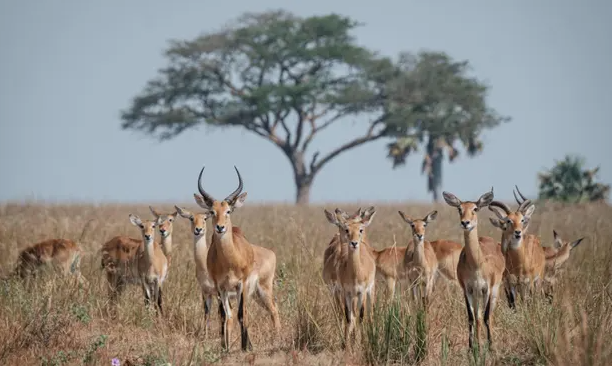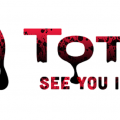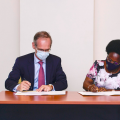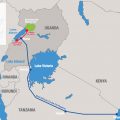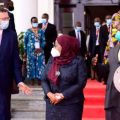The French oil and gas company TotalEnergies has worked to cultivate a green reputation with climate goals and plans to ramp up renewable power, but a massive east African oil project is casting a shadow over that messaging campaign.
Total plans to drill for oil in a richly biodiverse national park in Uganda and build a 900-mile pipeline, the East African Crude Oil Pipeline (EACOP), which will flow through sensitive environments to a port in Tanzania for export.
Burning that oil could release the equivalent of 34m metric tonnes of carbon dioxide a year into the atmosphere, according to opponents of the project, who point out scientists have said the world needs to drastically decrease, not increase, emissions.
Total, France’s second largest company by revenue, rebranded in May 2021, renaming itself TotalEnergies and adopting a rainbow-themed logo. But its work in east Africa has become a rallying point for protesters, including during large climate marches in France last month.
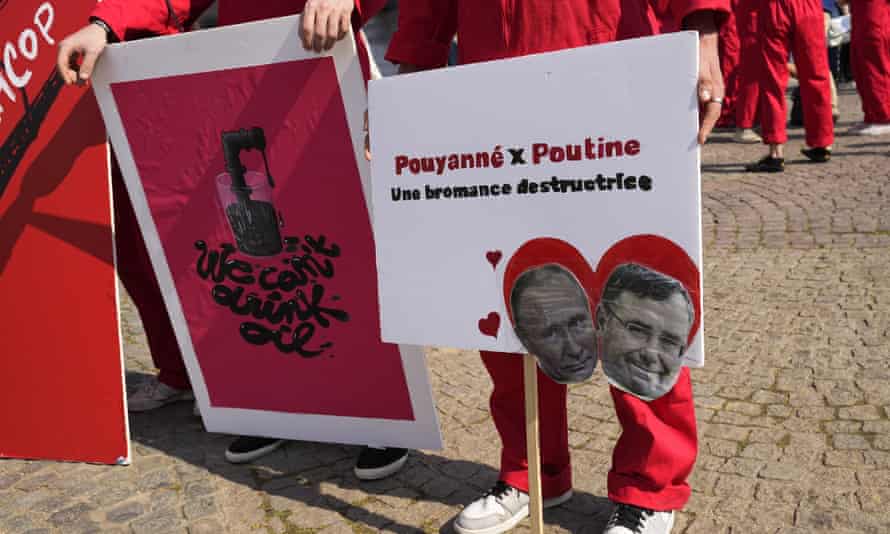
The project has also turned off investors. More than half of the banks that have historically financed Total have ruled out backing the project, a symbol of the difficulty oil and gas companies face as they try to thread the needle of appearing concerned about the climate crisis while continuing to extract fossil fuels. At least five insurers have also ruled out support.
“TotalEnergies used to be our favourite company in the sector”, said Dennis van der Putten, who works in responsible investing at the Dutch asset management company Actiam. “It’s with pain in our heart that we decided to exclude them. But we had to do it, from our sustainability point of view.”
The European Commission, the executive branch of the EU, said it “does not support the financing of oil projects in Africa”.
The criticisms of Total are increasingly isolating the French government and its president, Emmanuel Macron, who has repeatedly committed to get out of fossil fuels but has backed EACOP.
While France does not contribute financially to the project, it does provide diplomatic support. In a letter sent in early 2021 to Uganda’s president, Yoweri Museveni, Macron described EACOP as a “major opportunity” for the two countries to “expand their cooperation”.
The Élysée Palace and the French ecology minister, Barbara Pompili, declined to comment for this story.
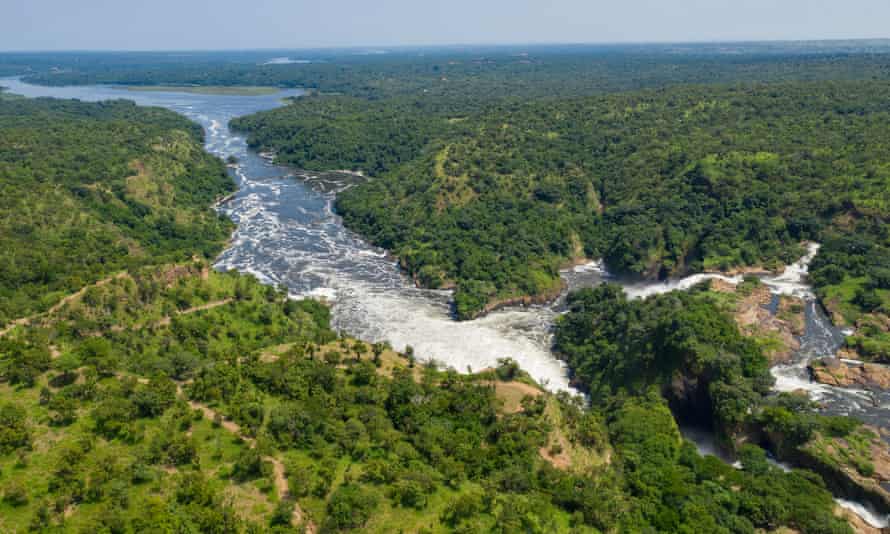
While Total has argued its project is “being carried out without the involvement of the French government”, a recent report from three environment and watchdog NGOs suggests Total has long employed “revolving door tactics” – hiring former senior civil servants and politicians, or seeing its own employees leave to work for the government.
The planning for the project has already stirred controversy over how people will be compensated for their land, leading to allegations of human rights violations and grabbing the attention of at least one member of parliament, Matthieu Orphelin, who wrote a letter to the French government highlighting what he described as the “proven violations of human rights and the environment”.
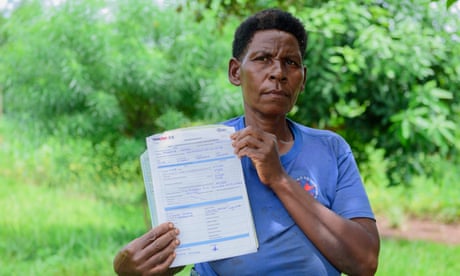
Developers first discovered Uganda’s promising oilfields in the early 2000s. The British company Tullow Oil saw success in test wells in 2006. By 2020, Tullow Oil had sold its stakes in the area to Total and China National Offshore Oil Corporation (CNOOC).
Total acquired the Tilenga fields within the Murchison Falls national park. The area includes a wetland site that is home to diverse species of birds. It also provides habitat to giraffes, elephants, giant pangolins, spotted hyenas, lions, chimpanzees, buffaloes, hippos, hartebeests, waterbucks, warthogs, oribis, Uganda kobs and grey duikers.
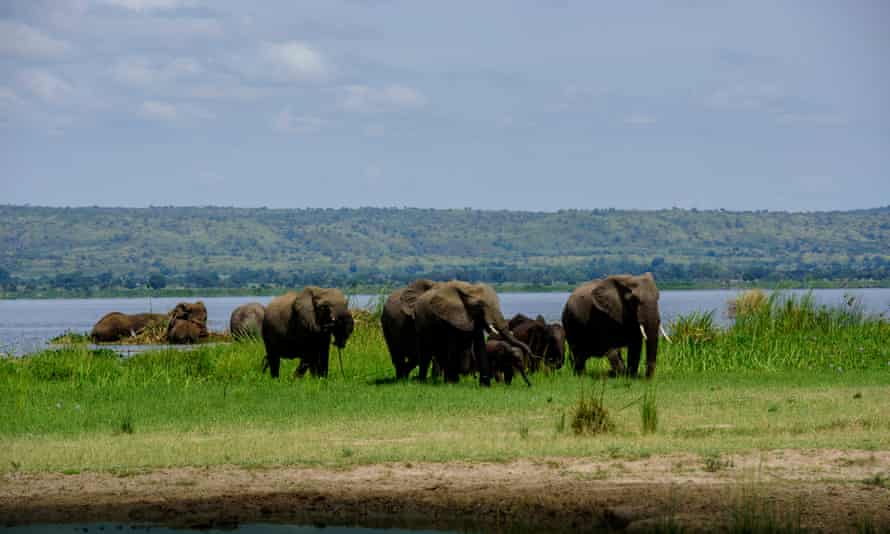
The Tilenga fields consist of more than 400 wells, with an estimated production of 190,000 barrels of oil a day. CNOOC will drill to the south, producing about 40,000 barrels a day, and both companies will send their oil through the EACOP pipeline.
Critics say the drilling and pipeline threaten biodiversity and jeopardise the water sources for the Nile River. Activists have also accused project developers of human rights violations. They say compensation has been late or insufficient and opponents have been intimidated and arrested. Their accounts have been relayed by UN special rapporteurs, although the UN high commissioner for human rights has not yet assessed the project, Total noted in a response for this story while condemning threats against peaceful protesters.
The project puts a significant dent in Total’s pro-climate claims. Total argues its east Africa work would have a far more limited climate impact than the 34m metric tonnes of carbon dioxide annually that opponents suggest. But that is because Total does not count the emissions that occur when its oil is burned. It takes responsibility only for the emissions of its own operations, which it estimates at about 23m metric tonnes of carbon dioxide over the lifetime of the project, about four decades.
Total has in recent years adopted a goal to be carbon neutral by 2050, even though its chief executive, Patrick Pouyanné, in 2020 mocked competitors who promised the same. Pouyanné in a recent interview argued that if Total abandoned its oil projects, another company would just take its place.
Reclaim Finance, an NGO, calculated that Total, the biggest European oil and gas developer, is planning a 33% increase in production by 2030 compared with current levels.
Just weeks ago, three environment groups filed a lawsuit against Total for “misleading” the public about its climate goals while it is making moves to expand production in Uganda, Mozambique and the Arctic, the groups said.
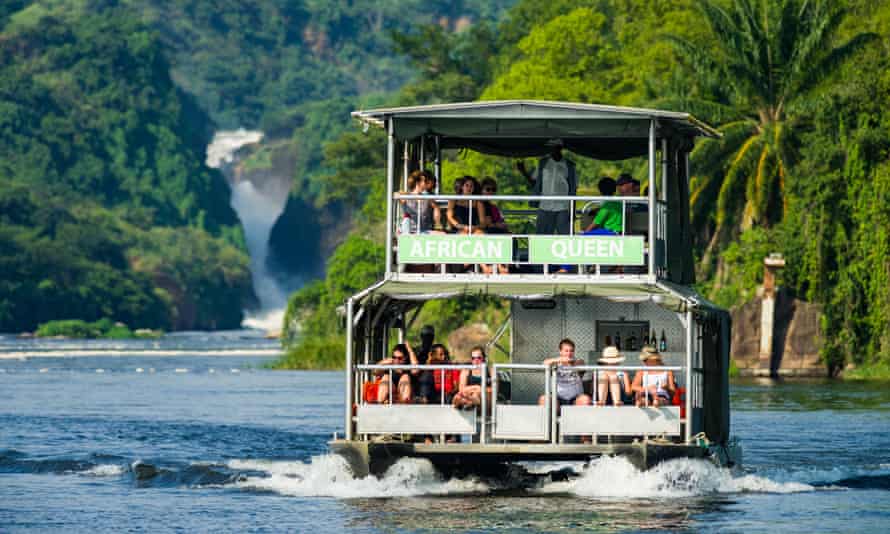
“People are entitled to know whether the companies competing for their business are fuelling or fighting climate change”, said Johnny White, a lawyer with the legal charity ClientEarth.
Chastened by a pushback against climate pollution, companies around the globe are increasingly looking to distance themselves from fossil fuels. That is what first drew the ethical investors at Actiam to Total.
“Our view was that Total was leading more in terms of climate action and renewables and that it was ahead compared to US and other European companies. We thought they had a credible energy transition strategy,” said Greta Fearman, a responsible investing expert for the firm.
But the EACOP project “rang some alarm bells”, she said.
One US engineer Actiam consulted, Bill Powers, warned that the project could pollute critical clean water supplies.
“There will be spills,” Powers said. You can’t avoid that, and that’s not really an accusation but an engineering reality.”
Powers said he was particularly worried about Total’s plans for an estimated 230,000 metric tonnes of hazardous waste of cuttings and drilling muds, which are loaded with heavy metals and other toxic substances.
In other projects, including in the North Sea, Total has drilled an injection well to send the waste back deep underground. But in Uganda it will have contractors transport it to landfills several dozen kilometres away, generating thousands of truck trips.
“Total presents that as a good thing, as jobs for Ugandans. That’s what I call putting lipstick on a pig. In reality, this waste might even never reach a secure landfill,” Powers said.
Total did not directly address the likelihood of spills or the concerns about waste disposal, but pointed to independent assessments that it says ensure the project is “implemented in accordance with best social and environmental practices”.
Total argues it is taking steps to produce a “net positive impact” on biodiversity, including by “reducing human pressure” on the park by offering drilling as an alternative economic activity to tourism.
In autumn 2021, Total proposed a global partnership with the International Union for Conservation of Nature to help reduce its impacts on biodiversity. But the Swiss-based NGO said it has not reached an agreement with the company yet and consultations are continuing.
Fearman said Total has acknowledged the project will have an environmental impact “but their position is that if you lose biodiversity somewhere, just compensate elsewhere, by supporting conservation programs in other parts of Africa”.
As Total comes under scrutiny by banks and investors for its east Africa work, the Dutch organisation BankTrack has pointed out that it has not disclosed who will provide the $3bn (£2.3bn) project loan required.
Shareholders have approved the EACOP project, but Total said its financing is “still being arranged with interested international financial institutions”.
“[It’s] no wonder this project is struggling to find financiers unscrupulous and reckless enough to back it,” Banktrack’s spokesperson, Ryan Brightwell, said.
Original Source: The Guardian

